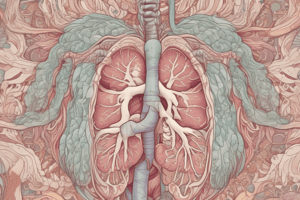Podcast
Questions and Answers
What type of tissue is found in the lamina propria of the respiratory epithelium?
What type of tissue is found in the lamina propria of the respiratory epithelium?
- Nervous tissue
- Muscular tissue
- Connective tissue (correct)
- Epithelial tissue
Which of the following cell types is responsible for producing mucus in the respiratory epithelium?
Which of the following cell types is responsible for producing mucus in the respiratory epithelium?
- Ciliated columnar cells
- Small granule cells
- Mucous goblet cells (correct)
- Basal cells
What is the main structural difference between extrapulmonary bronchi and intrapulmonary bronchi?
What is the main structural difference between extrapulmonary bronchi and intrapulmonary bronchi?
- Absence of Clara cells
- Presence of alveoli
- Presence of hyaline cartilage (correct)
- Thickness of the epithelial layer
Which of the following is NOT a type of bronchus?
Which of the following is NOT a type of bronchus?
What is the function of Clara cells in the bronchiole wall?
What is the function of Clara cells in the bronchiole wall?
Where is the respiratory epithelium typically found?
Where is the respiratory epithelium typically found?
What type of epithelium lines the vocal cords in the larynx?
What type of epithelium lines the vocal cords in the larynx?
What is the function of the pharynx in the respiratory system?
What is the function of the pharynx in the respiratory system?
What is the name of the gland cells found in the olfactory organ?
What is the name of the gland cells found in the olfactory organ?
What type of epithelium lines most of the conducting portion of the respiratory tract?
What type of epithelium lines most of the conducting portion of the respiratory tract?
What is the name of the structure that connects the nasal cavity with the larynx?
What is the name of the structure that connects the nasal cavity with the larynx?
What is the name of the cavity that consists of two structures: the external vestibule and the internal nasal fossa?
What is the name of the cavity that consists of two structures: the external vestibule and the internal nasal fossa?
Study Notes
Organs of the Respiratory System
- The respiratory tract consists of two parts: the upper respiratory tract and the lower respiratory tract.
Upper Respiratory Tract
- Nasal cavity (nasal fossa) consists of two structures: external vestibule and internal nasal fossa.
- Pharynx connects the nasal cavity with the larynx and has three parts: nasopharynx, oropharynx, and hypopharynx.
Larynx (Voice Box)
- Larynx connects the pharynx and trachea.
- Epiglottis, true vocal cords, and false vocal cords are found in the larynx.
Nasal Cavity
- Olfactory organ is a specialized area of the mucous membrane in the superior concha, located in the roof of the nasal cavity.
- Olfactory organ consists of four types of cells: olfactory cells, supporting cells, basal cells, and Bowman's gland cells.
Larynx Epithelium
- Vocal cords are lined by stratified squamous epithelium.
Respiratory Epithelium
- Most of the conducting portion is lined with ciliated pseudostratified columnar epithelium.
- Respiratory epithelium consists of four types of cells: ciliated columnar cells, mucous goblet cells, basal (short) cells, and small granule cells (dendritic cells).
Trachea
- Trachea wall layers are composed of mucosa (respiratory epithelium) and lamina propria (connective tissue).
Bronchi
- Extrapulmonary bronchi resemble the trachea in structure and contain hyaline cartilage.
- Intrapulmonary bronchi include secondary bronchi, tertiary bronchi, and bronchioles.
Bronchi Layers
- Extrapulmonary bronchi layers consist of mucosa, submucosa, hyaline cartilage, and adventitia.
- Intrapulmonary bronchi layers consist of mucosa, submucosa, smooth muscle, and adventitia.
Bronchioles
- Clara cells are found in bronchiole walls.
Alveoli
- Alveoli are the site of gas exchange in the lungs.
Studying That Suits You
Use AI to generate personalized quizzes and flashcards to suit your learning preferences.
Related Documents
Description
This quiz covers the organs and structures of the respiratory system, including the upper and lower respiratory tracts, nasal cavity, pharynx, and larynx.




